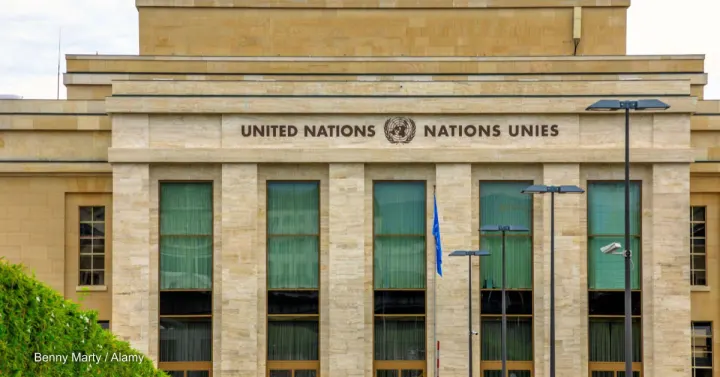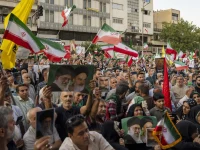Exclusive: UN trade center workers decry ‘toxic work culture’

MISCONDUCT just a sample of the allegations that scores of staffers at the International Trade Centre leveled at senior management in a survey produced by the Geneva-based United Nations Staff Union in December.
The online survey — which revealed responses from 196 current and past employees and contractors to questions about whether they had witnessed inappropriate conduct — paints a damning portrait of morale at a little-known U.N. agency that provides trade advice to low- and middle-income countries. It is a subsidiary of the better-known World Trade Organization and U.N. Conference on Trade and Development.
The Geneva-based outfit now employs some 400 people. Of those questioned, 86 claimed “to have been the victim of prohibited conduct over the past 12 months, mostly linked to abuse of authority and harassment,” according to the survey. More than half had “witnessed” misconduct, according to the 19-page survey seen by Devex and confirmed by three U.N. sources.
Together, the comments paint of picture of a deep cultural divide between the center’s rank and file and senior and middle managers, who are accused of hiring and promoting friends or favorites, and fomenting a “mass exodus” of staff in the human resources department, and a large number of staff on sick leave.
It is only the latest crisis in staff morale at a U.N. agency. Last year, more than 200 staffers, mostly women, at the World Food Programme signed a letter decrying the existence of a “mainly white, male-dominated club” that limited opportunities for women. Staffers at the U.N. Office for the Coordination for Humanitarian Affairs, or UNOCHA, also protested the lack of mobility by people of color into the top ranks of the organization.
The Pro read:
What development professionals should know before working at the UN
Former and current United Nations employees share their advice for those considering a career within the complex organization.
“OCHA has a racism and neocolonialism problem,” according to an anonymous complaint by one staffer in that complaint.
The rebuke of management at the International Trade Centre comes against a background of mounting frustration that formal channels for reporting misconduct by senior officials are ineffective.
“I know of many cases of abuse of authority and harassment that have been duly reported to HR and the Ombudsman that remained without any follow-up,” wrote one respondent.
The survey’s anonymous respondents reserved their toughest criticism for the Division for Programme Support, whose leader, Gerry Lynch, is currently on paid administrative leave, pending an investigation into the wider allegations of wrongdoing contained in the survey. Lynch had previously been the target of internal complaints of misconduct, but he has been cleared more than once of wrongdoing by senior managementand a review commissioned by ITC.
The survey also offered sharp criticism of the center’s executive director, Pamela Rosemarie Coke-Hamilton, alleging she failed to rein in inappropriate conduct by managers. The respondents also faulted Deputy Executive Director Dorothy Tembo and Human Resources Chief Helen Kwon-Karaul for failing to protect staff, as well as other unidentified managers.
“There is no beating around the bush: the ED [executive director] has buried her head in the sand,” said one anonymous respondent. “The ED has been here for very long now so she cannot go by the excuse that she doesn’t know what’s happening.”
Lynch, Coke-Hamilton, Tembo, and Kwon-Karaul declined requests for comment for this article.
The revelations — not previously made public — have sent Coke-Hamilton into crisis mode. She pledged in a staff town hall meeting and a series of email missives to fix any failings raised in the survey and assured U.N. donors they could count on her to steady the ship and hold any wrongdoers accountable for improper conduct.
“The report raised a number of troubling allegations in several areas,” Coke-Hamilton acknowledged in a Dec. 13 email to the center’s staff seen by Devex. “They all require dedicated and targeted management action.”
Coke-Hamliton pledged in another email the following day that she is “committed to holding a full, formal and thorough investigation of the issues raised by the survey.”
But she had also complained that the staff union had not conducted its survey in coordination with the trade center’s senior management or staff council, and that it had circulated the results of the survey widely in Geneva’s broader U.N. community.
“Neither I nor anyone in senior management was approached or engaged, at any stage, on the survey,” she wrote in the Dec. 13 email. “I have a very strong view regarding the manner in which the comments were publicly circulated, which I think undermines any good-faith effort to resolve the issues raised.”
For new year, UN seeks to temper expectations
Facing a year of woe, the United Nations has to settle for limited achievements in Ukraine and beyond.
Coke-Hamilton wrote that throughout her two-year tenure she had been aware of staff complaints about management, saying they were addressed “through the various fact finding and investigative procedures.”
“Some of these cases have been concluded and the concerned staff informed of the outcome,” she wrote in her follow-up email. “But what is clear is that there were other situations that needed to be addressed: situations where staff members have suffered; situations where ITC and the UN system must do better.”
So far, the trade center has yet to decide who will conduct the investigation, and under what terms. In the meantime, Coke-Hamilton has taken a number of administrative steps to address staff concerns, including the hiring of a special advisor on human resources matters, and the appointment of an ombudsperson to hear staff’s confidential concerns, according to a Jan. 10 email from Coke-Hamilton to ITC staff. Coke-Hamilton will also appoint a senior official to run the Division for Programme Support while Lynch is on leave, according to the email.
Lynch denied the allegations of misconduct in an email to Coke-Hamilron, saying he believed that he was the victim of “malicious claims” by an unidentified staff member whom he says has “orchestrated a vengeful retaliatory campaign against me.” Lynch claimed that he was targeted because he had overseen administrative proceedings against the staffer for “complaints of harassment and misconduct.”
“The staff comments included in the survey are extremely defamatory statements toward me that are disingenuous, factually incorrect, offensive to other ITC staff, and hurtful to me and my family,” he wrote. The “multiple allegations against me,” he added, “renders my position…untenable at this time.
“It is with great sadness, after ample reflection, and with the advice of my legal counsel, that I am hereby requesting to be placed on Administrative leave with full pay…until a full review and investigation into the allegations filed – or otherwise insinuated – against me have been completed,” Lynch wrote in the Dec. 14 email to Coke-Hamilton.
In an email response on the same day, Coke-Hamilton wrote: “I completely understand your decision and hereby approve your request to be placed on administrative leave with pay with immediate effect. This in no way constitutes a predetermination of culpability for any of the allegations made but will allow us the space to conduct a thorough investigation in the overall interests of ITC.”
Multiple staffers from the trade center have lodged formal complaints against Lynch to the U.N.’s Office of Internal Oversight, or OIOS, including one stemming from June 2018 misconduct allegations. In a February 2021 memo, Coke-Hamilton wrote that OIOS “found no evidence of alleged harassment, discrimination and abuse of authority. Based on the report findings, I have decided to close the case and exonerate you of all the charges …”
The trade center, meanwhile, commissioned an outside review of some 10 separate anonymous claims of misconduct that had been lodged with OIOS against Lynch and the human resources department.
“The allegations made in the ten claims are not supported by the documentary or testimonial evidence,” the report concluded, according to a two-page summary of the report shared with Devex. It is unclear who conducted the review, which Devex has not seen in full, making it impossible to assess its independence.
Exclusive: UN development boss placed on leave
The executive secretary of UNCDF is forced from top U.N. finance job, setting off high-level war of words over the merits of the case.
“The wholesale absence of supporting evidence, likely the basis for OIOS to decline to investigate the claim, and the unified focus of the ten allegations, gives the appearance of being mala fide complaints … [and may] constitute a pattern of harassment,” according to the summary.
The staff survey — conducted between Nov. 30 and Dec. 9 — showed that 65 respondents felt they had been the victim of abuse of authority, 43 experienced harassment, five endured sexual harassment, and 38 faced some form of discrimination. The largest share of employees — nearly 60 percent — complained they had been victims of prohibited conduct while working in the Division for Programme Support. More than 40% worked in the office of the executive director.
The survey does not identify any of the respondents, or provide detailed accounts of alleged wrongdoing. It assembles 81 anonymous comments by ITC staffers and contractors. While the overwhelming majority of comments are highly critical, a handful of respondents said they had neither been the targets of misconduct nor witnessed it.
Devex was not able to independently confirm the veracity of specific allegations. But three U.N. sources verified the authenticity of the survey.
One respondent accused the center’s management of improperly playing favorites.
“A small number of “friends” of Directors and Chiefs get all the opportunities, visibility, and promotions… Some Directors and Chiefs discriminate on the basis of skin color, others on nationality, and other[s] on whether the person is part of the “group” or not,” the respondent claimed.
Efforts to pursue accountability through the center’s official channels have been unsuccessful, according to multiple respondents. “In general, I would say that the available channels to report the abuse of authority in the UN are highly ineffective,” said one respondent.
“The mismanagement of resources was most visible in the Division of Programme Support, given that their approach in handling the human resources was to benefit some of their staff/friends by upgrading them to higher grades…” according to a respondent.
ITC was established in 1964 by the General Agreement on Tariffs and Trade, the precursor to the World Trade Organization, and the U.N. Conference on Trade and Development, with a vision of promoting trade as a means to foster growth and employment in low- and middle-income countries.
While the WTO sets the rules for international trade, and UNCTAD conducts research and analysis on global trade trends, the center is tasked with working directly with small businesses, policymakers, and financial institutions to promote trade in small- and medium-sized economies.
“We offer small businesses, policymakers and business support organizations in developing countries an array of trade-related practical training, advisory services, and a wealth of business intelligence data,” the center says on its web page. “We help micro, small and medium-sized businesses become more competitive and help to create better regulatory environments for trade.”










